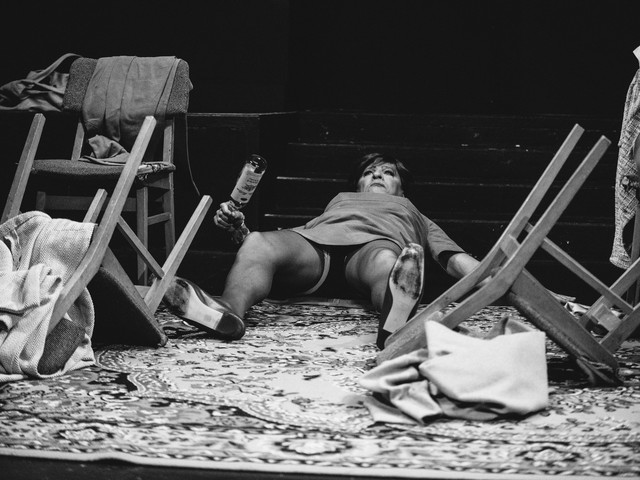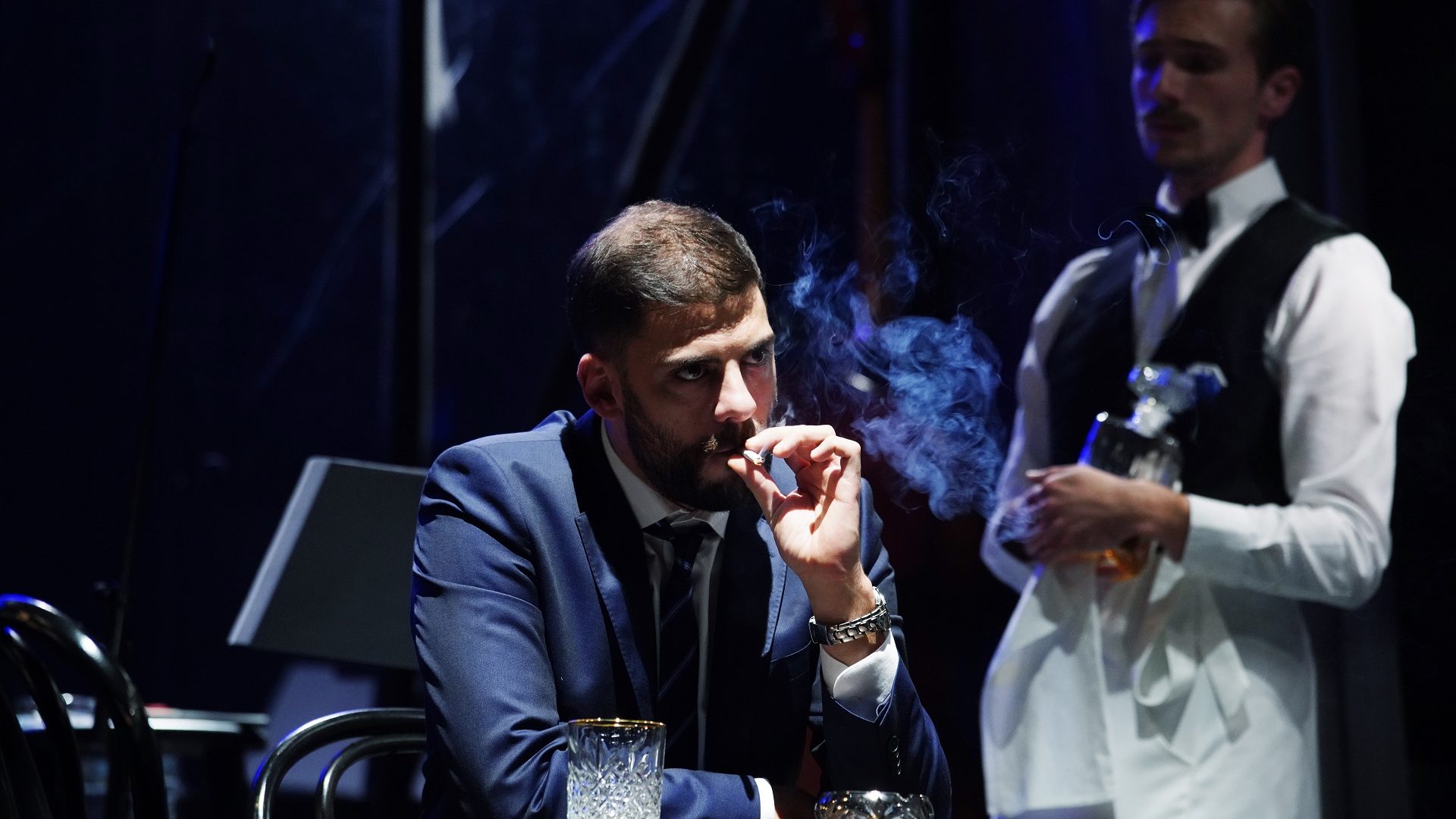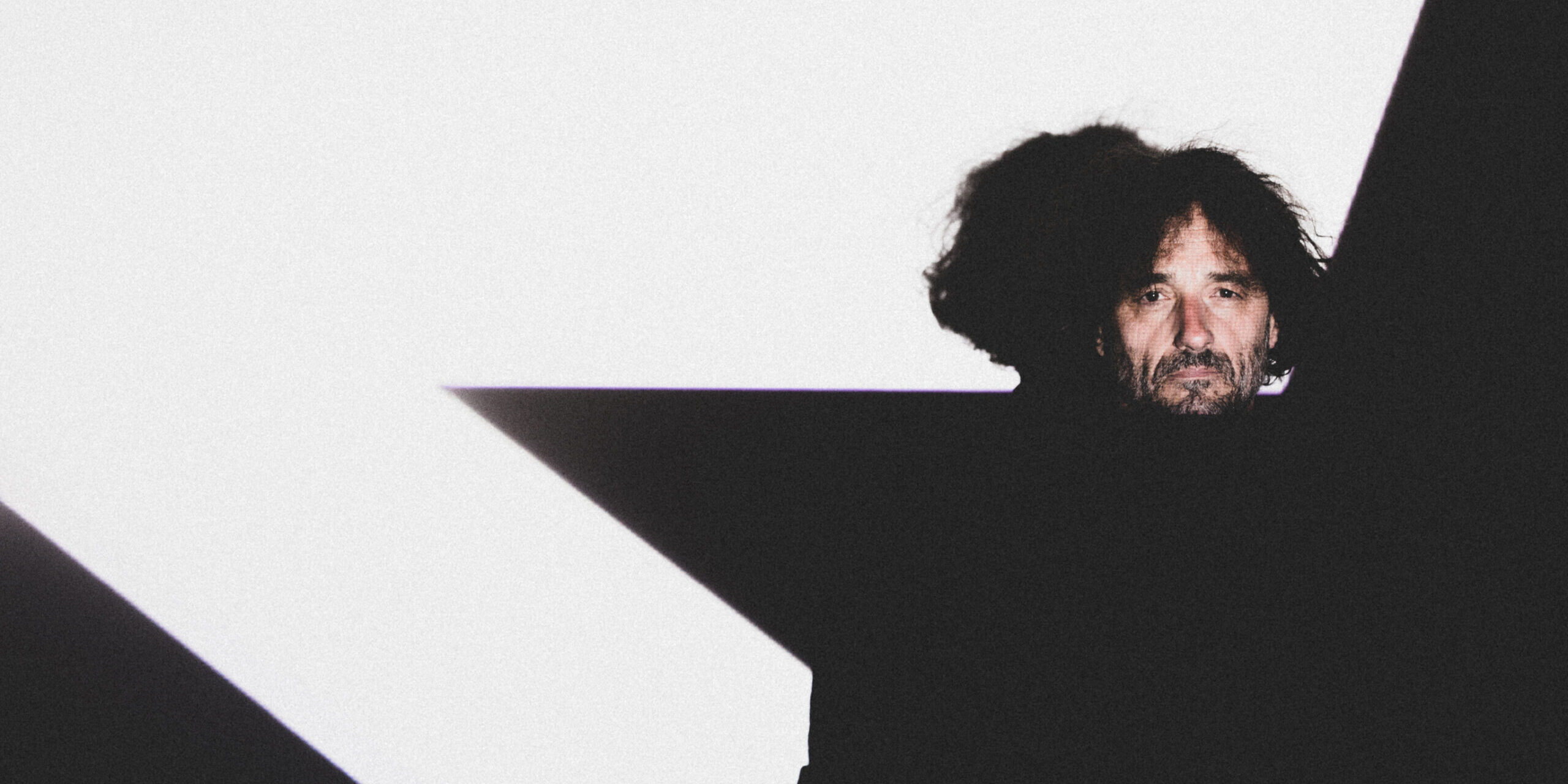Prolific Slovenian theatre director Vito Taufer talks to Ivana Kocutar about his new show Žbam!, why he is reengaging with traditional forms of theatre and the differences between working in Belgrade and Ljubljana.
Ivana Kocutar: Your new show Žbam!, which is currently playing at the Mladinsko Theatre, was originally going to be based on the play 5fantkov.si by Simona Semenič. Žbam! retains a strong connection to the original play but draws out different aspects. Why was the thinking behind this transformation?
Vito Taufer: 5fantkov.si was our starting point. Simona was interested in how the play, which was originally intended for five actresses in the roles of boys, could be interpreted by mature male actors. At our first meeting, I suggested expanding the original themes of 5fantkov.si. Simona agreed, but what she then wrote a new play that took on certain aspects of 5fantkov.si, but also allowed itself to touch on some more current and acute issues.
One of the more practical reasons was that I had already chosen a team of five male actors. We agreed that it would be interesting, to shift the roles once more (as it was intended in 5fantkov.si) and make male actors play women’s parts. Simona wrote a play in which five women of diverse backgrounds and a shared love of theatre get together to form an amateur theatre group. They are working on a play that deals with violence, politics, sexuality, and other burning issues. It is always fun to see men playing women, but it can quickly border on cliché and stereotypical representation. In this case, we wanted to distance ourselves from simplified views on issues of gender identity, politics, violence, and sexism. We wanted to avoid the standard aggressor-victim relationship between men and women. We thought about how the situations on stage could address the themes in a broader, more nuanced way.
The task, although at all times treated with provocative humour, had to be approached with the utmost discipline and seriousness. We were walking on slippery ground. But that is precisely what interests me, the thin line between the serious and unserious, the tragic and the comic, social criticism and poetics of the absurd ,which often annoys people who cannot distinguish theatre from the pulpit or the classroom. It seems to me that the theatre has this capability of intervening in spaces of unresolved (or unresolvable) social and psychological contradictions and tensions.
Ivana Kocutar: This line in Žbam! was evident in the audience’s laughter. People laughed a lot at the beginning, but then at a certain point they realised that laughter wasn’t suitable anymore…
Vito Taufer: We wanted to achieve it that the spectators at a certain point catch themselves laughing at something horrible. If we had prepared people in advance to witness something of that nature, it probably wouldn’t have had the same effect. Perhaps we could say that it would not have been so cathartic then.
Ivana Kocutar: There are many layers of theatrical illusion in the play.
Vito Taufer: We wanted to approach theater in a self-referring and self-ironic way. There are many layers in the play that had to be carefully woven. Five male actors enact their view of a group of women actresses who in turn enact their view of men and the male world.

Žbam! at Mladinsko Theatre
Ivana Kocutar: Žbam! is at once a performance-within-a-performance and a professional production about performing an amateur theatre production. What do you find interesting about the differences between amateur and institutional theatre?
Vito Taufer: We Slovenians have traditionally a loving attitude towards amateurism in general. Amateur theatre offers a certain spontaneity and passion that professional, institutional theatre sadly often loses. Performing an amateur theatre we also wanted to paint an auto-ironic picture of the current identity crisis through which theatre has been going for some years now, when everything in theatre is becoming more and more amateurish. This is because theatre wants to break as much as possible with certain traditional procedures.
Experimentation is necessary for theatre but it is always in a way amateurish, because you never exactly know, or even want to know, what the results will be and where the process will lead you. As the old Chinese proverb puts it, if you want to get somewhere you’ve never been before, take unknown paths…
But because of this violent demand for novelty and originality, which is certainly also a reflection of the needs and demands and the overall logic of capital, it is unwittingly becoming more and more amateurish and dysfunctional due to the un-reflected abandonment of traditional knowledge and methods, as well as institutional norms. Theatre is nowadays often subjected to the arbitrary actions of authorities in institutions, who are insensitive to art and artists. In the case of small Slovenian theatre space, their aim is more of a matter of status, power, and influence than capital. All this happens at the expense of art, artists, and ultimately the public.
With the new millennium and new social, political, and also technological conditions a significant decline in audience numbers and their interest in theatre started to take place in our country. Panicking theatre institutions tried to save themselves by hyperproduction, which is unfortunately still present, more and more. Instead of investing in a manageable number of performances, the post-production, and motivating the audience, to maintain the audience rates, they have started to hyper-produce projects, which due to the crowding in repertoires, remain underfunded. It is also a common practice for performances to remain underperformed and unused. This is a complete drain on the creative energy and commitment of artists, not in the least a waste of money.
The introduction of contemporary procedures and the search for original paths have, of course, also driven away some audiences and, in the absence of a general social interest in theatre, creators are logically beginning to turn to small groups of like-minded people. But this in no way solves the problem of a shrinking public and the crisis of theatre institutions.
This crisis has been exploited by the increasingly ruthless commercial offer, above all, in television, but to a surprising extent also in theatre. It has become clear that we have to try a little harder if we want to keep theatre standards on a professional level and get larger numbers of the audience back into the theatre voluntarily.
I always understood my theatre as a universal form of theatre, for the audience in the widest possible sense of the word, for everyone, the young, old, educated, or not. Perhaps it is time to reflect and look back at what is dusty and forgotten in theatre history. Things that the public also must be missing in times of an ever more insatiable craving for the new and the original. That is why I have begun to turn to more traditional forms and methods of work, to the classical text, the theatre in a box, theatrical magic and sorcery, illusion, old poetry, the well-told story, and of course comedy and satire. In these times of monologue and loneliness, we must remember that theatre is fundamentally a social project. It is a matter of dialogue. At Belgrade’s Yugoslav Drama Theatre, I recently staged Sophocles’ Oedipus in this ‘classical’, psychological sense, with an emphasis on telling a good suspenseful story. And the Belgrade audience loved it, declaring the performance the best of the season…
Ivana Kocutar: You have been employed as a director at the Mladinsko Theatre since 1989. The position of a resident director is not so common in the Slovenian theatre space anymore. How do you see your role there?
Vito Taufer: When the relatively open, but above all rich, diverse, and inspiring Yugoslav cultural space closed in the early 1990s, I ended up working mostly with the same team. The Mladinsko Theater, where I was then, invited to be a permanent director, we worked on our productions for months. It was a great privilege to work consistently with the same team and with plenty of time for rehearsals and for experiment and we made good use of it. We could go very far in our explorations also because we knew each other so well. For the work we did in the 90s, this was essential. With a familiar and established team, a director can work in more depth. For me, it’s actually still interesting to work with people I’ve known for 30,even 40 years. Human beings are an infinite source of ideas, energies, and states of mind.
And perhaps the routine is established even sooner when traveling from one theatre to another, especially with the shorter and shorter time spans for creative processes that institutions give us, one gets to know people only superficially and each time reproduces the same idea of man and the world.

Oedipus at Yugoslav Drama Theatre. Photo: Nebojsa Babic
Ivana Kocutar: Music plays an important role in your production of Oedipus.
Vito Taufer: Yes, Brecht invented nothing new, it was all there in Greek tragedy. Music can do both; it
can alienate and immerse. Magnifico’s and Schatzi’s musical parts are exactly at the places
where the Greek chorus appears in the play. The content of the songs is also derived from the content of the original Sophocles’ choruses. The structure and the content are therefore identical, translated into the language, the music, and the rituals of today. We have moved the action from the public space of the agora to the café. In Serbia, the kafana still has the function of a sacred space, where everyone can meet a whole cross-section of society at the tables every day, various members of the social elite, politicians, writers, football players, artists, and criminals. This gives the impression of a kind of democratic transparency. Whether this impression is deceptive or not, the fact remains that the kafana is still a kind of traditional shrine to sociability, and music there an important ritual element.
Ivana Kocutar: And what was it like working in Belgrade, at the Yugoslav Drama Theatre, on that production? How do things compare to Ljubljana?
Vito Taufer: Belgrade is a big city. There are five times as many people there as in Ljubljana, so there’s a bigger audience. The theatre also has a noticeably bigger role. And the actors as well. Belgrade had one of the world’s most important contemporary theatre festivals [BITEF] at a time when we had maybe one experimental theatre here, and when we’re, in this European capital of ours, still nowhere near such a festival.
Professionalism in rehearsals, professional technical equipment, professional organization, and last but not least professional criticism. Professional in every way. The performances are still sold out. The actors impressed me with their enthusiasm and seriousness, but also with their human openness. Most of the actors there are all very busy making TV series and films, but still, the working process ran very smoothly. The bigger city is of course also more inspiring. The thoughts and gestures are bigger, braver, and more far-reaching.
For more information, visit: Mladinsko.com
Further reading: review of Oedipus at Yugoslav Drama Theatre, Belgrade
Ivana Kocutar is a young writer from Slovenia. She is a BA student of Philosophy and German Language at University of Ljubljana and a contributor to online critical platforms Neodvisni, and EU contemporary puppetry critical platform. Her main interests are contemporary dance and theatre.








